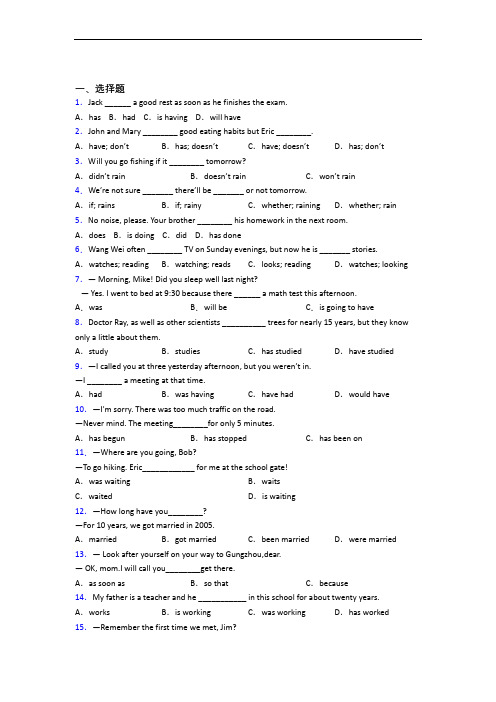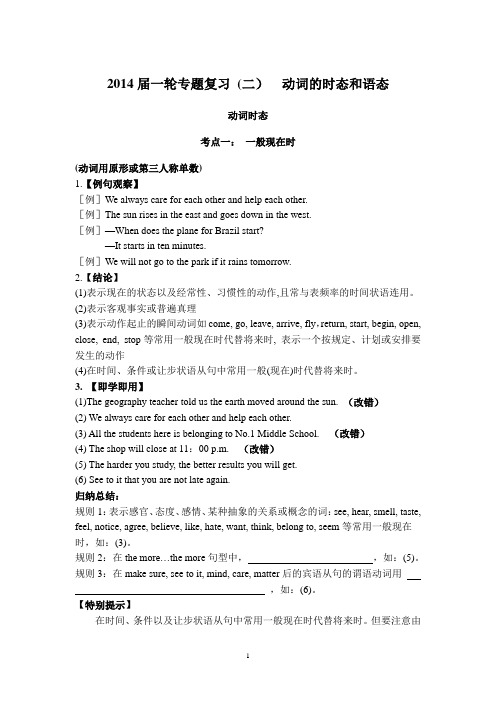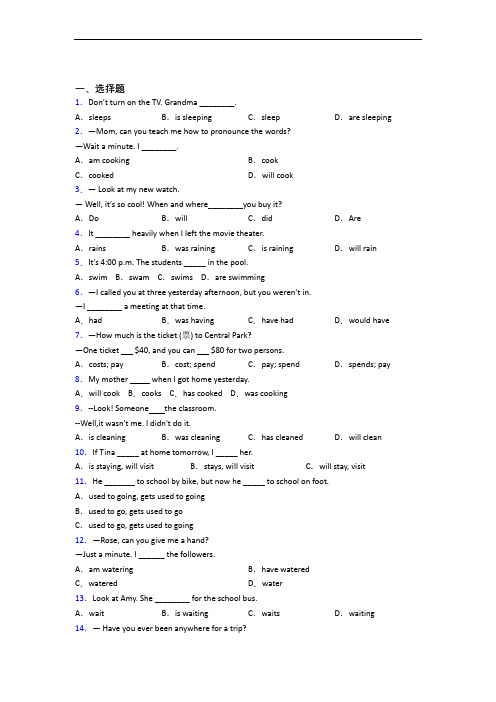动词时态复习(二)
2021年初中英语语法知识—动词时态的知识点总复习含答案(2)

一、选择题1.Jack ______ a good rest as soon as he finishes the exam.A.has B.had C.is having D.will have2.John and Mary ________ good eating habits but Eric ________.A.have; don’t B.has; doesn’t C.have; doesn’t D.has; don’t 3.Will you go fishing if it ________ tomorrow?A.didn’t rain B.doesn’t rain C.won’t rain4.We’re not sure _______ there’ll be _______ or not tomorrow.A.if; rains B.if; rainy C.whether; raining D.whether; rain 5.No noise, please. Your brother ________ his homework in the next room.A.does B.is doing C.did D.has done6.Wang Wei often ________ TV on Sunday evenings, but now he is _______ stories. A.watches; reading B.watching; reads C.looks; reading D.watches; looking 7.— Morning, Mike! Did you sleep well last night?— Yes. I went to bed at 9:30 because there ______ a math test this afternoon.A.was B.will be C.is going to have 8.Doctor Ray, as well as other scientists __________ trees for nearly 15 years, but they know only a little about them.A.study B.studies C.has studied D.have studied 9.—I called you at three yesterday afternoon, but you weren’t in.—I ________ a meeting at that time.A.had B.was having C.have had D.would have 10.—I'm sorry. There was too much traffic on the road.—Never mind. The meeting________for only 5 minutes.A.has begun B.has stopped C.has been on 11.—Where are you going, Bob?—To go hiking. Eric____________ for me at the school gate!A.was waiting B.waitsC.waited D.is waiting12.—How long have you________?—For 10 years, we got married in 2005.A.married B.got married C.been married D.were married 13.— Look after yourself on your way to Gungzhou,dear.— OK, mom.I will call you________get there.A.as soon as B.so that C.because14.My father is a teacher and he ___________ in this school for about twenty years. A.works B.is working C.was working D.has worked 15.—Remember the first time we met, Jim?—Of course I do. You ________ in the library.A.were reading B.have read C.will read D.read16.The water ______ cool when I jumped into the pool for morning exercise.A.was felt B.is felt C.felt D.feels17.---Where have you been recently?---I _______ in Hangzhou on business for a week last month.A.have been B.had gone C.had been D.was18.Can you describe ________?A.what the student look like B.what does the student look likeC.what does the student looks like D.what the student looks like19.Mr. Smith ______ our school next year.A.will visit B.visits C.was visiting D.visited20.—How did the accident happen?—You know, it was difficult to see the road clearly because it________.A.was raining B.has rained C.is raining D.will rain 21.Sandy likes ________ TV. She ________ TV every day.A.watching; watching B.watch; watchesC.to watch; is watching D.watching; watches22.Could you please turn down your music? I________.A.work B.works C.am working D.worked23.My father was reading ________ I was sleeping.A.while B.when C.before D.after24.—Do you still play the piano?—Oh, no. I ________it since last year.A.didn’t play B.haven’t played C.don’t play25.—How much is the ticket (票) to Central Park?—One ticket $40, and you can $80 for two persons.A.costs; pay B.cost; spend C.pay; spend D.spends; pay【参考答案】***试卷处理标记,请不要删除一、选择题1.D解析:D【解析】句意:Jack一完成他的考试就要好好的休息一下。
专题复习 (二)学生版 动词的时态和语态

2014届一轮专题复习(二)动词的时态和语态动词时态考点一:一般现在时(动词用原形或第三人称单数)1.【例句观察】[例]We always care for each other and help each other.[例]The sun rises in the east and goes down in the west.[例]—When does the plane for Brazil start?—It starts in ten minutes.[例]We will not go to the park if it rains tomorrow.2.【结论】(1)表示现在的状态以及经常性、习惯性的动作,且常与表频率的时间状语连用。
(2)表示客观事实或普遍真理(3)表示动作起止的瞬间动词如come, go, leave, arrive, fly,return, start, begin, open, close, end, stop等常用一般现在时代替将来时, 表示一个按规定、计划或安排要发生的动作(4)在时间、条件或让步状语从句中常用一般(现在)时代替将来时。
3. 【即学即用】(1)The geography teacher told us the earth moved around the sun. (改错)(2) We always care for each other and help each other.(3) All the students here is belonging to No.1 Middle School. (改错)(4) The shop will close at 11:00 p.m. (改错)(5) The harder you study, the better results you will get.(6) See to it that you are not late again.归纳总结:规则1:表示感官、态度、感情、某种抽象的关系或概念的词:see, hear, smell, taste, feel, notice, agree, believe, like, hate, want, think, belong to, seem等常用一般现在时,如:(3)。
小升初语法动词的时态和语态专项练习题 (2)

小升初语法动词的时态和语态专项练习题参考答案与试题解析一.选择题(共15小题)1.Danny usually________the park on Sundays.()A.goes to B.is going toC.go to【分析】Danny通常在周日去公园。
【解答】考查一般现在时及动词的第三人称单数。
usualy用于一般现在时的句子中。
题干的主语是Danny,第三人称单数,谓语动词用第三人称单数形式。
go to the park去公园。
go的第三人称单数是goes。
故选:A。
【点评】考查一般现在时及动词的第三人称单数,要结合关键时间副词判定时态,结合句子主语,认真作答。
2.Guo Yang never computer games.()A.play B.plays C.played D.playing【分析】郭阳从来不玩电脑游戏。
【解答】考查一般现在时及动词的第三人称单数。
题干少谓语动词。
表达"从来不玩"是习惯性的动作,时态为一般现在时,句子主语是郭阳,第三人称单数,谓语动词用第三人称单数形式。
play是动词原形;plays是动词的第三人称单数;played是动词的过去式;playing是动词的现在分词。
故选:B。
【点评】考查一般现在时及动词的第三人称单数,要结合关键词判定时态,然后根据句子主语选择,注意保持主谓一致。
3.Look,Wang Hong ___in a chair.()A.sits B.sit C.is sitting【分析】看,王红正坐在椅子上。
【解答】考查现在进行时。
根据句中Look可知事情正在发生,Wang Hong 第三人称单数,谓语动词用is,sit的现在分词是sitting。
故选:C。
【点评】熟练掌握现在进行时的用法,灵活运用。
4.There are eleven pigs. They are _______ vegetables .()A.eat B.eating C.is eating【分析】有十一头猪。
最新初中英语语法知识—动词时态的知识点总复习含答案解析(2)

一、选择题1.Don’t turn on the TV. Grandma ________.A.sleeps B.is sleeping C.sleep D.are sleeping 2.—Mom, can you teach me how to pronounce the words?—Wait a minute. I ________.A.am cooking B.cookC.cooked D.will cook3.— Look at my new watch.—Well, it’s so cool! When and where________you buy it?A.Do B.will C.did D.Are4.It ________ heavily when I left the movie theater.A.rains B.was raining C.is raining D.will rain 5.It’s 4:00 p.m. The students _____ in the pool.A.swim B.swam C.swims D.are swimming6.—I called you at three yesterday afternoon, but you weren’t in.—I ________ a meeting at that time.A.had B.was having C.have had D.would have 7.—How much is the ticket (票) to Central Park?—One ticket $40, and you can $80 for two persons.A.costs; pay B.cost; spend C.pay; spend D.spends; pay 8.My mother when I got home yesterday.A.will cook B.cooks C.has cooked D.was cooking9.--Look! Someone the classroom.--Well,it wasn't me. I didn't do it.A.is cleaning B.was cleaning C.has cleaned D.will clean 10.If Tina _____ at home tomorrow, I _____ her.A.is staying, will visit B.stays, will visit C.will stay, visit 11.He _______ to school by bike, but now he _____ to school on foot.A.used to going, gets used to goingB.used to go, gets used to goC.used to go, gets used to going12.—Rose, can you give me a hand?—Just a minute. I ______ the followers.A.am watering B.have wateredC.watered D.water13.Look at Amy. She ________ for the school bus.A.wait B.is waiting C.waits D.waiting 14.— Have you ever been anywhere for a trip?— A trip? I ________ away from my hometown even once.A.went B.have gone C.have been D.have never been 15.The water ______ cool when I jumped into the pool for morning exercise.A.was felt B.is felt C.felt D.feels 16.While I_______ a detective story, someone_______ at the door.A.read, was knockingB.read, knockedC.was reading, knockedD.was reading, was knocking17.--What age did you leave home ?--I left home at 18. I ___your city for five yearsA.have gone to B.have been to C.have been in D.have come to 18.The film Operation Red Sea_____a lot of praise since its first show months ago. A.wins B.win C.will win D.has won 19.It’s 8 o’clock. The students _________ an English class.A.have B.having C.is having D.are having 20.—Did you hear the strange noise next door around 9 o’clock last night?— No, I ________my favourite film in my bedroom.A.watch B.watched C.am watching D.was watching 21.Don’t talk! The baby ________.A.sleeps B.is sleep C.sleeping D.is sleeping 22.— What do you use MP3 for?— I ________ it ________ to music.A.use; listen B.are listening; listeningC.use; to listen D.is listening; to listening23.My father was reading ________ I was sleeping.A.while B.when C.before D.after 24.Look! All my classmates ___________ on the playground.A.are running B.ran C.were running D.run25.—I can’t find Peter. Where is he?— He ______ tea in the living room.A.drinks B.drinking C.is drinking D.drink【参考答案】***试卷处理标记,请不要删除一、选择题1.B【解析】【分析】【详解】句意:别开电视,奶奶正在睡觉。
W动词的时态(二)现在完成时、过去进行时、过去将来时、过去完成时

动词时态1.现在完成时定义:用来表示之前已经发生或完成的动作或状态,而对现在产生了影响: 动作或状态发生在过去,但它的影响现在还存在。
也可表示持续到现在的动作或状态。
时间标志:for, since, so far, ever, never, just, yet, till/until, up to now, in the past few years, recently, …-----模糊的时间状语动词形式(结构标志):have/has(助动词)+done(动词的过去分词形式)1)现在完成时强调动作的完成Where have you been since I saw you?自我上次见你之后,你到哪里去了?Technical innovation has brought about tremendous changes to the plant.技术革新已给该厂带来巨大变化。
2)现在完成时表示从过去持续到现在的状态Give me something to eat ,please. I haven’t eaten anything since yesterday.给我点吃的。
我从昨天开始就没有吃任何东西了。
3)现在完成时与特定词语照应这些词包括:since(自从),so far (迄今为止),as yet(迄今为止),over the past···(在过去的······时间里)等等So far we haven’t drawn any conclusion on this matter.至今我们还没有就这件事情得出任何结论。
Over the years, a large number of overseas students have studied at the university.多年以来,有大量国外留学生在那所大学就读。
Topic Two 动词时态(二)

Topic Two 动词时态(二)一、现在完成时体验一:基本构成肯定式: 助动词(have/has) +动词的过去分词否定式:助动词(have/has)+ not疑问式:将have/has 提到句首体验二:基本用法任务一:用括号内所给动词的适当形式填空1.—Come and have some meat.---- Thank you.I ______ just ________my lunch. ( eat )现在完成时的―完成用法‖指的是过去某一时刻发生并已经结束的动作,强调的是动作发生后对现在造成的影响或结果。
如上句,eat 这一动作已结束,对现在的影响是肚子饱了,不想吃了。
任务二:完成句子2.我的很多同学都去过北京Many of ny classmates _______ _______ to Beijing.现在完成时表示在过去发生过一次或多次的动作,对现在来讲已成为一种体验和经历任务三:改为同义句3. The movie began about 20 minutes ago.The movie has _______ ________ for about 20 minutes.现在完成时态的―未完成用法‖指的是过去已经开始的动作一直延续到现在,甚至有可能继续延续下去。
如果句中有表示―段时间‖的状语,应将短暂性动词转换成延续性动词,如:come—be, go out ---be out , leave—be away(from), begin—be on , borrow—keep , join---be a member of , die --- be dead, become—be 等。
体验三:时间状语任务四:请用适当的副词填空:4.My sister has ________been a top student at school.5. We haven’t had any news from him ___________.6. Have you ________ been to our city before?常与现在完成时连用的时间状语有:already,yet , ever, never, just, in the past 等。
高二英语一对一第8次课时态2
时态复习(二)一、考点、热点回顾1、考点:过去进行时,过去将来时2、热点:2种时态具体用法3、2种时态详解一、过去进行时(一)定义:过去进行时,是表示过去某个具体时刻正在进行的事情或动作。
(二)结构:was/were +doing (现在分词)(三)用法1、过去进行时表示过去某段时间内持续进行的动作或者事情。
常用的时间状语this morning,the whole morning,all day yesterday,from nine to ten last evening,when,while 例如:We were watching TV from seven to nine last night.昨天晚上七点到九点的时候我们在看电视。
What was he researching all day last Sunday?上周日他一整天都在研究什么?My brother fell while he was riding his bicycle and hurt himself.我哥哥骑自行车的时候从车上摔下来,受伤了。
It was raining when they left the station.他们离开车站的时候天正在下雨。
When I got to the top of the mountain,the sun was shining.当我到达山顶的时候,阳光灿烂。
2. 过去进行时可以表示在过去某个时间点发生的事情。
时间点可以用介词短语、副词或从句来表示。
如:What was she doing at nine o'clock yesterday?昨天晚上九点她在做什么?(介词短语表示时间点)When I saw him he was decorating his room.当我看见他的时候他正在装饰房间。
(when从句表示时间点)3.在复合句中,如果主要动作和背景动作都是延续的或同时发生的,那么主从句的动词都可用过去进行时。
7.动词时态二(中考英语语法及练习题)
时态(二)一般过去时和过去完成时的比较1.一般过去式只是表示事情发生在过去,陈述一个事实,现在完成时表示某一完成的动作对现在造成的影响或结果,强调的是现在的情况,所以它不能和确定的表示过去的时间状语连用。
如:We have seen that film. 我们已看过那部电影。
对现在造成的影响是我们对影片已有所了解。
We saw the film last night. 昨天晚上我们看了那部电影。
只说明昨天晚上看电影这一事实。
一般过去时通常和确定的表示过去的时间状语如:last night, in 1999, three days ago等连用。
现在完成时通常与”for+一段时间, since+一个过去的时间,already, yet, before, once, twice, * times, ever, never等连用。
注意:有些时间状语,如this morning,tonight, this month 等,既可用于一般过去时,又可用于现在完成时,但所表达的意义有所不同。
用于现在完成时表示包括现在在内,而用于一般过去式则与现在无关。
如:I have read this book this April.(说话时仍然为四月。
) I read this book this April. (说话时四月份已过。
)2. 一般过去式和过去完成时的比较:一般过去式表示过去时间发生的动作或存在的状态,而过去完成时在过去某一时间或动作之前已完成的动作或状态,即"过去的过去"。
当强调过去某一动作发生在某一动作之前时,常用此时态。
如:He had finished his homework before nine o'clock.九点之前他已经完成了作业。
实际上,一般现在时和过去完成时常搭配使用。
如:When he got home, his daughter had already gone to bed. 当他到家的时候,他的女儿早已去睡觉了。
2023年安徽省中考英语总复习一轮复习:第2讲-动词的时态和语态 (二)-教案
A. design
B. designed
C. are designing
D. are designed
9. Lots of people like to take a walk on Nanjing City Wall since it _______.
A. repaired
B. was repaired
-- He has gone to the supermarket. (3)have/ has been in:待在某地,住在某地。 例:I have been in Nanjing for three years.
2. for 和 since 的区别 (1)since 的用法 A. since 后可加时间点,如:It has been nine years since 1987. B. since 引导时间状语从句时,后面的时间状语从句动词用一般过去时,主句动词用现在完成时 (2) for 的用法:for 后加一段时间。如:They have worked in the factory for ten months . (3)since 和 for 用法的相互转换:for +一段时间= since+ 一段时间+ ago (4)对 since 和 for 的提问用 how long。如: —How long have you been in Nanjing?
1.表示经常性或习惯性发生的动作; 2.描述客观真理、客观存在或科学事实等; 3.在时间、条件状语从句中,用一般现在时表将
来。
be 动词的一般过去时 was/were+表语
1.表示过去存在的状态; 2.表示过去经常存在的状态。
行为动词及其他连系动
词的一般过去时
动词时态考点聚焦(二)
( 已前 往) od nt t 将 L n o a O —
( 正在 接受治疗) n i
3 一 H a ey u d c d d a e d ? . v o e ie l a y r
叫 e .I s a nc . to e
t m e g nc oo h n r v d a h he e r e y r m w e I a r e t t e i
A.d d tyo e B.h v n’ y e n i n’ u se a e t ou se
C . d ty e n D.d ha n’ ou s e on’ y e t ou se
6 .W h n M ay hu re m e he o d t t e r rid ho ,s f un ha h rbo ks e o i he caso n t lsr om. B.h d lf a et D . d be n lf ha e et
TESTI NG AN D EVALUAT1 0N
考 试 与 评 价 2 0 .8 0 90
语法考点
【 考点归纳 】
一
、
对 一般过 去 时的 考查
般过去时表 示在过去某一特定 时间或 某段 时 间发 生 的动作 或存 在 的状 态 或过 去反 复发生的动作 ,它常与表示过去的时间状语 连 用 , 如 :e edy l t e , a ih,h ys ra,a k l t g t te t s we sn oh rdy js n w,wody g ,n 2 0 , t te a ,ut o t asao i 0 8 a ta t ,h n等 。 第 1 3 1 题 。 h ti te me 见 ,,1 此外 , 如果 表 示过 去 某 一段 时 间 内经 常 或反 复发 生 的 动 作常与 o e , s l ,e o 等表示频度的副 f n uu l s dm t ay l 词连 用 。 【 析】 . 解 1 D。 由句 中 “u n w I m bt o a a lrrn 可知 , i aa” b i 我过 去 在 一 家化 工 厂 工 作 , 现 在我是一名图书馆管理 员,故前面要用一般 过去时。 . 。由句 中a o c 可以推测“ 3B t ne 我立 即就作 出 了决 定” 是发 生在 过 去 的 时间 , 以 所 用 一般 过 去 时。 1. “ts 1 在 Ii+时 间段+s c” i e n 引导 的 时 间状 语从 句这 一结构 中 ,从 甸 用 一 般 过去 时。 二 、 过去 进行 时 的考查 对 过 去进 行 时表 示在 过去 某 一 时刻 或某 段 时间内正在进行或发生的动作 ,强调动作未 完成。 对过 去进 行 时的考查 通 常放 在特 定 的 语 境 中,如 : hn whl a 等 引 导 的时 间状 w e, i, s e 语从句。如果主句谓语和从句谓语都发生在 过去, 动作 时 间长 的用 过 去进 行 时 , 达谈 话 表 情景 : 动作 时间短 的用 一般 过 去 时 , 达新 的 表 信 息。 见 第 4 9题 。 、
- 1、下载文档前请自行甄别文档内容的完整性,平台不提供额外的编辑、内容补充、找答案等附加服务。
- 2、"仅部分预览"的文档,不可在线预览部分如存在完整性等问题,可反馈申请退款(可完整预览的文档不适用该条件!)。
- 3、如文档侵犯您的权益,请联系客服反馈,我们会尽快为您处理(人工客服工作时间:9:00-18:30)。
动词时态复习(二)
一、一般过去时
1. 表示过去发生的动作或存在的状态,常跟有一个表示过去时间的状语。
如:
I caught a fish twice that big last week.
We were all excited on the wedding day.
2. 表示过去习惯性的动作。
如:
He gave Mary surprising gifts every Christmas.
3. 在时间或条件状语从句中,常用一般过去时代替过去将来时。
如:
The students wouldn't leave until the teacher came back.
Ann said she wouldn't go shopping if it rained.
二、过去进行时(构成形式为:was / were +动词-ing形式)
1. 表示过去某一时刻或某一阶段正在进行的动作。
如:
I was trying to fix a machine before you arrived.
They were building a dam last winter.
2. 表示过去打算做某事。
如:
The teams were leaving a few days later.
3. 表示说话人的某种情绪,常与always, forever, frequently等连用。
如:Frank was always changing his mind.
三、过去完成时(构成形式为:had +动词-ed形式)
1. 表示过去某一时间或动作之前已经发生或完成的动作。
如:
I had finished writing the article when they came.
2. 表示在过去某一时间之前已经开始并一直持续到那时的动作或状态。
如:By six o'clock they had worked for twelve hours.
3. 表示过去本打算做某事却未能实现的希望和意图,只适用think, hope, expect, want, intend, plan, mean等表示意愿的动词。
如:
They had wanted to help but couldn't get here in time.
【即学即练】用括号内所给动词的正确时态填空。
The clock 1. ________ (strike) eleven as Alice reached her flat. She 2. ________ (light) a final cigarette and sat at her dressing-table thinking of the party she 3.
________ (leave) an hour before. She would have been home much earlier but she 4. ________ (have) difficulty in finding a taxi at that late hour. Realising that if she didn't go to bed quickly, she 5. ________ (feel) tired at work next day, she put down her cigarette, undressed quickly and 6. ________ (get) into bed. She fell asleep at once. At that moment, the cigarette which she 7. ________ (forget) to put out dropped from the side of the ashtray.
Upon waking, Alice found that the cigarette not only 8. ________ (burn) a hole in the cloth, it had also made an ugly mark on the wood.
答案:
1. was striking
2. lighted / lit
3. had left
4. had
5. would feel
6. got
7. had forgotten 8. had burnt / had burned。
